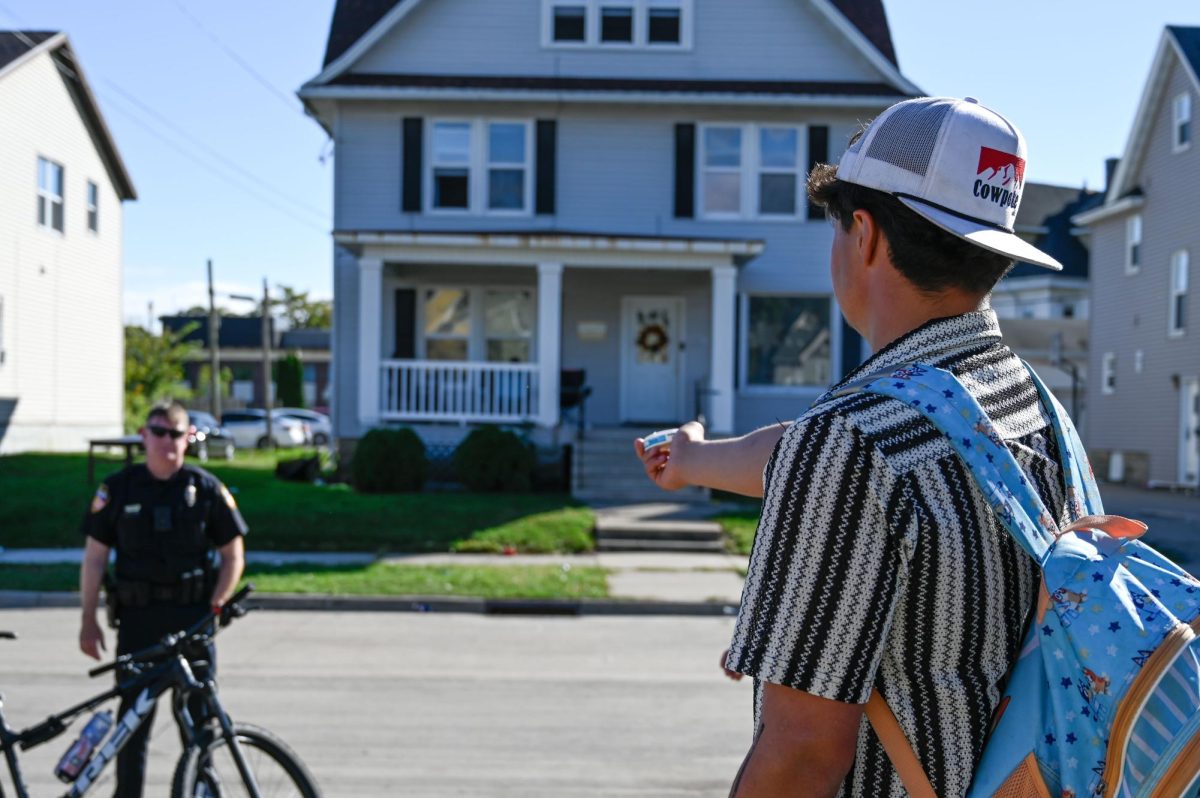Chancellor Leavitt released a new five-year strategic plan earlier this month, outlining the Universitys forward-looking goals which are meant to enhance student success, promote academic excellence, expand community involvement and build an inclusive and supportive environment at UWO. The Chancellor believes this plan puts UWO on a path toward continued success in the future, in part because it was put together through what he calls a comprehensive strategic planning process, something he has been an advocate of for a long time. I was on the [UWO] website not too long ago and I saw my very first press conference which occurred on the twenty-ninth of September in 2014, Leavitt said. I was in my office in Georgia, they had just named me into the role [as Chancellor] earlier that day, and the first thing I started talking about was the need for a comprehensive strategic plan. Leavitt believes that although he has many great ideas moving forward, the most important visions are the ones that come from within a variety of different areas of the University. What people will say is, Chancellor, what is your vision for the institution? Leavitt said. While I would certainly be happy to provide lots of examples of great vision, the only visions that really matter are ones which come from within and so it is all about putting together that very comprehensive process. Leavitt said he began on this process almost immediately after arriving on campus and assigned Provost Lane Earns the task of putting together a team and report by early this year. When I got here, it was during the summer or early fall, I charged the provost the task of running a process which would produce this strategic plan by sometime in January or February, Leavitt said. And so he went about and assembled a roughly 60-person committee, which contained not only representation from the four shared governance groups, with students being one of those, but also across classifications making sure there were faculty, academic staff, university staff and we engaged people from the outside as well throughout the process. Leavitt said the plan was sent through a number of advisers and committees before finally reaching the goals of the plan, which they would use moving forward. We had a person who is very knowledgeable about running these processes come on our campus and help facilitate this process, Leavitt said. And they had four, pretty intense, three-hour meetings in which they put together pretty much the bones of what the plan would look like. The plan was sent to the steering committee for three or four months before the priorities emerged. The action committee then took the strategic priorities as they began to form and worked with them until they got to the goals and so forth, Leavitt said. In addition to this rather lengthy process, Leavitt said the progress was continually examined in the public through open houses. We went to our alumni association, our foundations board, the board of councils and advisers and the students to gain input [for] the plan, Leavitt said. The plan reached the Chancellors Desk toward the end of the process, according to Leavitt. The plan finally got to me pretty late in the process where I had the opportunity to make some of my own comments and suggestions, Leavitt said. One of the major components of this plan is an increased focus on faculty research opportunities, especially if that research is being done with a student. I know first-hand the profound transformative effects that undergraduate research has on the undergraduate student, Leavitt said. We have tremendous efforts going on in our campus right now, but I see how we can do so much more if we paid some attention to it. We have an excellent faculty and its about engaging them in what they love and what they really love to do is work within their discipline with students. Leavitt also said moving toward a research-enhanced comprehensive university is another goal of this plan, in the continuing effort to make UWO a more research-friendly campus. This is meant to allow faculty to move in directions that are both beneficial to them in their work life while at the same time enhancing the experience for undergraduate students, Leavitt said. What we are doing here is looking at what we are doing in research and saying How can we position research to be more beneficial to not only the institution, but also the students? So thats what it means to be research enhanced. Even with this shift to more of a research-friendly position for UWO, Leavitt said the main focus is still on the students and their achievements while on campus as outlined in the Strategic Priorities section of the plan. Students will always continue to be our first priority, Leavitt said. Looking at our first strategic priority, Enhancing Student Success, my favorite one is increasing the retention, progression and graduation rates. We need to increase those, in a sense that we are putting a lot of current resources at the institution into improving them. This is what we think that the University Studies Program (USP) is all about. Some other kinds of strategies we have employed just this year will be helping in really moving the numbers and making sure that our students are as successful as they can be. UWO senior Jade Johnson agreed with the Chancellor that improving the graduation and retention rates is an important part of this five-year plan. I think that the second goal under the Enhance Student Success [priority] is important because graduation rates are pretty low, Johnson said. I know sometimes the idea of a liberal education can get in the way of that [goal]. Some people get weened out by that because they want to do what they are interested in instead of taking some classes that they dont care about very much. While the idea of a liberal education can be helpful in some areas, sometimes it is not. UWO junior Stefan Jacobson also named the goal of increasing retention, progression and graduation rates as one of the most important to him. I like the goal to increase retention, progression and graduation rates because it is something that can be measured, Jacobson said. Some of the goals on here, like transform the life of the faculty, may be hard to determine success. In addition to increasing graduation and retention rates, the Chancellor said he is a big advocate for another goal: Increasing equity, diversity and inclusion across every level of the University. We are already an increasingly popular school for students of color, students of diversity and we need to make sure we are building the kind of inclusive and welcoming environment to sustain them, Leavitt said. This is a very important goal to me; to make sure we are moving the needle on equity and diversity. Jacobson said he believes this goal is an essential part of the five-year plan. I like the idea of increasing equity, diversity and inclusion because this campus is not very diverse, Jacobson said. As someone who has lived in places that are more diverse, there are definitely advantages to having a more diverse community; it gives you experiences which make you a more well-rounded individual. In addition to the two goals the Chancellor outlined in some detail is a subsection of goals which focuses on expanding community engagement and economic development. This section, according to UWO senior Jordan Hansen, is the most important to students because it pertains to life after college. We are here in college to get an education, Hansen said. We are paying for a service and that is to teach us something that is going to help us and benefit us in the future. This goal discusses economic development and entrepreneurship, as well as community engagement efforts, which are integral parts of education, especially with the business school. Hansen said this section, although it does not explicitly talk about life on campus, is important because a major goal of getting a college education is becoming hirable after graduation. This goal is related to what we do here, Hansen said. The point of going to college is to be able to go out and get a job. We arent just coming to college to learn some things and not do anything with it; we are coming to college to prepare ourselves for a future career. Overall, the Chancellor said the plan is something he takes pride in and he is very excited to see it implemented university-wide in the near future. I am very excited about this plan and this is going to be the blueprint as to how we operate this institution for the next five years, Leavitt said. It is a living and breathing document, one which may transform a little bit here and there as we actually get the plan into practice, but I am very pleased and proud of the efforts of this University to produce this quality of a plan.
Categories:
University lays out goals for campus excellence
March 16, 2016
0








